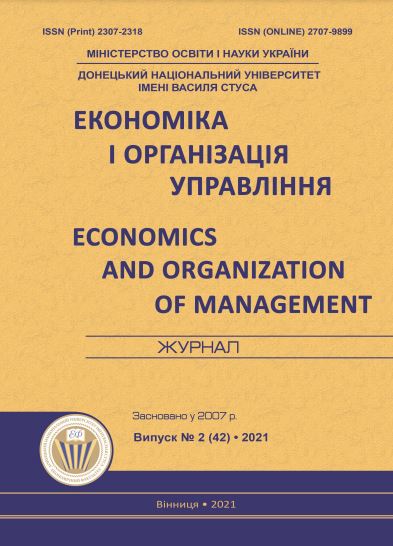Пом’якшення феноменів «розтрати мізків» і «відтоку мізків» в Україні: конвергенція економічних та освітніх трансформацій
DOI:
https://doi.org/10.31558/2307-2318.2021.2.5Ключові слова:
міграція; «відтік мізків»; «розтрата мізків»Анотація
В статті розглядаються такі поняття як brain drain («відтік мізків») і brain waste («розтрата мізків») та аналізується сучасний стан професійної міграції в Україні. «Відтік мізків» – це феномен, що описує міграцію висококваліфікованого населення в більш розвинені країни, спричинені глобалізацією, економічною незбалансованістю світу та політикою розвинених країн. «Розтрата мізків» – це явище, яке описує повну або часткову втрату компетенцій людиною при роботі на посаді, що не відповідає її кваліфікаційному рівню.
Проаналізовано міграційні тенденції в Україні. Збільшується потік студентів, що навчаються за кордоном завдяки програмам обміну та міжнародним проектам. Щодо професійної міграції, то основними країнами, що приймають емігрантів з України є сусідні країни, в тому числі Польща, що співпадає зі світовими тенденціями, згідно з якими люди найчастіше мігрують в сусідні країни з більш розвиненими економіками.
Також в статті наведено приклади боротьби з наслідками «відтоку» та «розтрати мізків» в різних країнах. Шляхами зменшення наслідків можуть стати зміни у податковій політиці, грошове стимулювання вчених, а також стимулювання економіки, наприклад через коопетицію між університетами, урядом та бізнесом.
Посилання
Global Flow of Tertiary-Level Students (2021) UNESCO UIS Database. Retrieved from: uis.unesco.org/en/uis-student-flow#slideoutmenu.
Bartolini, L., Gropas, R., & Triandafyllidou, A. (2017). Drivers of highly skilled mobility from Southern Europe: escaping the crisis and emancipating oneself. Journal of Ethnic and Migration Studies, 43(4), 652-673.
Beine, M., Docquier, F., & Rapoport, H. (2001). Brain drain and economic growth: theory and evidence. Journal of development economics, 64(1), 275-289.
Carr, S. C., Inkson, K., & Thorn, K. (2005). From global careers to talent flow: Reinterpreting ‘brain drain’. Journal of world business, 40(4), 386-398.
Demographic and social statistics/Population and migration (2021). Database of State Statistic Service of Ukraine. Date of last modification 31st of May, 2021. Retrieved from: ukrstat.org/uk/operativ/menu/menu_u/ds.htm.
Docquier, F., & Rapoport, H. (2012). Globalization, brain drain, and development. Journal of economic literature, 50(3), 681-730.
Iredale, R. (2001). The migration of professionals: theories and typologies. International migration, 39(5), 7-26.
Mahroum, S. (2000). Highly skilled globetrotters: mapping the international migration of human capital. R&D Management, 30(1), 23-32.
Marx, M., Singh, J., & Fleming, L. (2015). Regional disadvantage? Employee non-compete agreements and brain drain. Research Policy, 44(2), 394-404.
Mattoo, A., Neagu, I. C., & Özden, Ç. (2008). Brain waste? Educated immigrants in the US labor market. Journal of development economics, 87(2), 255-269.
Meyer, J. B. (2001). Network approach versus brain drain: lessons from the diaspora. International migration, 39(5), 91-110.
Mountford, A. (1997). Can a brain drain be good for growth in the source economy? Journal of development economics, 53(2), 287-303.
Özden, Ç. G. (2006). Educated migrants: is there brain waste?. REMITTANCES &, 227.
Pires, A. J. G. (2015). Brain drain and brain waste. Journal of Economic Development, 40(1), 1-34.
Shvindina H., Lyeonov S. The Key Features of Labour Migration Processes in Ukraine. New Trends and Best Practices in Socioeconomic Research : III International Science Conference SER 2020, Igalo (Herceg Novi), Montenegro, September 17th – 19th, 2020. Montenegro : University Mediterranean, 2020. P. 71.
Van Der Wende, M. (2015). International Academic Mobility: Towards a Concentration of the Minds in Europe. European Review, 23(S1), S70-S88. doi:10.1017/S1062798714000799
Vorontsova, A., Shvindina, H., Petrushenko, Y., & Hordiienko, V. (2020). Reforming the education system to prevent labor migration. Knowledge and Performance Management, 4, 52-66. DOI:10.21511/kpm.04(1).2020.05

